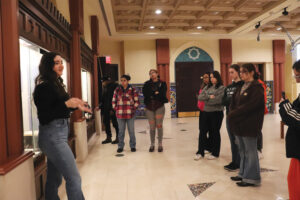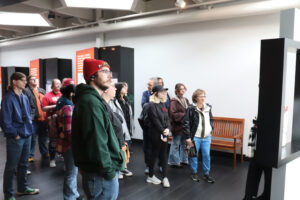

Over 40 students of various majors signed up to attend an outing to Farmington Hill’s Zekelman Holocaust Center and Dearborn’s Arab American National Museum.
Friday’s trip offered students a look into Jewish and Arab American culture through museum exhibits, personal testimonies and Mediterranean cuisine. After tours, the group was treated to lunch at Stage Deli Restaurant, a Jewish deli in West Bloomfield and Al Ameer, a Lebanese restaurant in Dearborn.
Transportation, admission, lunch and dinner were funded by the Innovation Accelerator Grant. Applying for the grant was the collaborative effort of members of Ferris’ Shoah Committee. Shoah Committee director and history professor Dr. Tracy Busch saw this trip as an exercise in “radical tolerance.”
“It came from the fact that I think intolerance is so easy right now, to the point where you have to disrupt the flow of hate that comes out of… media,” Busch said. “The way to disrupt that is to pause, spend hours and take something in that you’re not normally taking in.”
Busch hopes this trip turns into an annual event with up to 50 students. While the majority of students in attendance study in the humanities and social sciences, the trip attracted a group with diverse educational backgrounds.
Freshman math education major Vivian Cash was quick to ask questions about the Arab world while touring the AANM. Museum docent Youla Nassif, Cash’s tour guide, answered with enthusiasm and personality.
“I was surprised to hear how countries such as Lebanon, specifically, are very peaceful and aren’t war-torn countries like we see in the media,” Cash said. “It made me think about how much propaganda I am really consuming without even realizing it.”
Nassif is a marketing senior at the University of Detroit Mercy. Throughout the tour, she melded the museum’s history with firsthand stories, memories of her grandmother’s cooking and how life in both Kuwait and Lebanon has shaped her identity as an Arab American.
“I believe that tying my personal story of why I came here and how my family immigrated to the U.S. helps the guests imagine and understand how it felt going through immigration,” Nassif said.
The tour covered a wide range of topics, including the Abrahamic religions and Islamic architecture. Guests entering the AANM were greeted with high ceilings and mosaics of green, blue and tan; colors that hold deep significance for the natural world in the Quran.
Thorough education of Middle Eastern history is sparse at Ferris. Nassif sensed and appreciated the students’ desire to learn during the tour.
“I especially enjoyed the questions I received from [Ferris students], which made it clear to me how much they are interested and curious about learning more about the history and culture of… the Arab world in general,” Nassif said. “I would like to also mention how I was very impressed and happy to hear about this university’s commitment to raise awareness about the current events in the Middle East and its proactive stance in addressing them.”
History sophomore Tyler Lawton attended the trip to further his goal of becoming a historian. Pen and paper in hand, he paid close attention during the guided tour of the Zekelman Holocaust Center.
“There were so many Jewish families that were being separated and slaughtered by German soldiers,” Lawton said. “What shocked me the most was that we wait until the end to decide we need to help them.”
The Zekelman Holocaust Center is unique in its speaker series of Holocaust survivors’ children. Dina Kawer is an artist, photographer and daughter of Holocaust survivor Benjamin Kawer. Students listened intently to her remarks about her father.
Benjamin Kawer was one of four men to escape a death march at a small, widely unheard-of concentration camp. At the time of his escape, he stood 5’11’’ and weighed only 70 pounds. He joyfully lived into his late 80s, allowing him to pass down his story through generations, all the way down to his great-grandson.
“Adversity doesn’t build character, it reveals it,” Dina Kawer said.
Benjamin Kawer survived World War II in his late teens, which makes Dina Kawer especially appreciate the opportunity to speak to young students.
“It’s not only a way to honor my dad, and to honor family’s memories, but it’s a way to make sure that people are cognizant that this level of hate exists in the world. It existed back then and exists to this day. Hopefully, by educating yourself about this, it will allow you to maintain a sense of vigilance and recognize it when it rises again. And he always told me, it will rise again,” Dina Kawer said.
When discussing the genocide of the Holocaust, both Dina Kawer and tour guide Henry Smith used language that points to the past, present and future.
“Dehumanizing anyone can open the door to dehumanize everyone,” Smith said.
With eyes on the current moment as conflict and hatred persist, Ferris’ Shoah Project also arranged a panel titled Understanding the Conflict in Gaza. Speakers include Saeed Khan and Howard Lupovitch of Wayne State University and Ron Stockton of the University of Michigan – Dearborn. Read next week’s Torch for full coverage of the event.
S.E. E.S.
CE – AM
